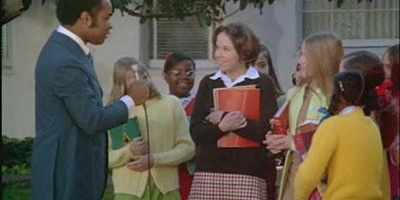Women’s Liberation in Sitcoms: Then and Now
Situational comedies, or sitcoms, tend to be viewed as bottom of the barrel, low-art television. They feature predictable plots, obvious morals, and archetypal situations. How many times have we seen a kid take home a poor report card and try to hide it from their parents, or maybe one of the characters learns that their wild lifestyle (or in the case of Rudy Huxtable, a life of staying up past nine) isn’t all it’s cracked up to be?

These familiar plots can be called archetypal at their best, cliche at their worst. These plots are relatable, though, and keep the sitcom in familiar territory. People don’t want to be challenged by sitcoms (although some of the best are quite revolutionary, like Roseanne), they want to relate to the characters and laugh with them or at their naivety and hijinks.
In a recently aired episode of The Brady Bunch on TVLand, “The Liberation of Marcia Brady,” dating from 1971, a familiar plot plays out, the “You Go Girl” trope, as TVTropes labels it. The episode begins with Marcia Brady, the eldest daughter, being interviewed by a newsman after school, who asks her how the women’s liberation movement is affecting teenagers. The newsman brings up Marcia’s brothers, to which Marcia declares that it is unfair that boys think they can do more things than girls can.
At home, Marcia’s brothers give her a hard time for the interview, and even Mike, the father, thinks “the women’s liberation movement” is a funny idea. Marcia, in protest, decides to join the all boys Frontier Scouts, to prove that girls can do whatever they want. What ensues is a series of trials in which Marcia passes, including setting up a tent and a long hike through the woods. At the end of the episode, Marcia makes it into the troupe, but explains that she never really wanted to join in the first place. She then goes and reads a “fashion magazine” with mother Carol.
The episode immediately recalls several other similar-plotted episodes, including The Simpsons episode “Lisa On Ice,” a Punky Brewster plot, and an episode of Lizzy McGuire. But even more so, an episode of animated sitcom King of the Hill, “Bobby Slam,” comes to mind, with some poignancy.

The episode in question revolves around Connie Souphanousinphone’s desire to join the junior high school’s wrestling team after Peggy Hill encourages her to. Earlier in the episode, Peggy had been substituting for a girl’s gym class, where she realized that the school offers far more benefits to male students. Her protests for more basketballs and uniforms for the girls go unheard by the administration, so to shake things up, she tells Connie to join whichever sport she wants.
Bobby Hill, who usually dislikes team sports, has been enjoying wrestling thus far, and the coach of the team, to get back at Peggy, pits best friends Bobby and Connie against each other in the wrestling ring, hoping to deter Connie from joining. In the end, Bobby and Connie work together, staging a fake match, using “pro” wrestling moves and fake blood, effectively making a mockery of the coach’s reign.
“Bobby Slam” was originally aired in 1997, over twenty-five years after “The Liberation of Marcia Brady” aired. Bad grades and staying up late are situations that will always seem contemporary. They’re practically built into society, maybe because of television. Both of those particular situations are fairly innocuous. “Women’s liberation,” not so innocuous.
Gender stereotypes, according to these two pieces of media, are essentially the same as they were nearly thirty years ago. Young girls (young people in general) still face these gender stereotypes, that boys enjoy and are good at one thing, and girls, another. It seems absurd to even bring up, as most anyone will say that “girls and boys can do whatever they want,” and this is great to say and even to think, but as a whole, is this truly what society values?
Granted, the episode of King of the Hill itself is also fairly old, nearing the twenty year mark. Much has happened, at least in North America, in terms of liberation, as a post-Gay Liberation movement United States continues to make progress toward a more accepting and freer population, along with third-wave feminism and trans-awareness, since the episode aired.
Perhaps the episode isn’t truly indicative of anything, merely fulfilling its television trope role. The King of the Hill writers are rarely lazy (“A Firefighting We Will Go,” a combination of The Three Stooges and Rashomon, is particularly great television), but perhaps “Bobby Slam” is a run of the mill episode, with a cliched plot dating from the early 1970s.

There is an interesting diversion from the trope, though, in “Bobby Slam,” that is worth noting. At the end of “The Liberation of Marcia Brady,” she essentially liberates herself from the liberation movement. By proving she can join the scouts if she wanted to but in the end taking the fashion magazine, she ends the conversation with an exclamation point. Although the ending seems to offer only more stereotypes (likes like fashion, boys are scouts), Marcia goes with her gut instinct instead of her political one, and never does something she does not want to do. In a way, she has her bra and burns it, too, but it is almost equally important not to conform to the “liberation movement” as it is to not conform to the stereotypes its fighting.
Connie’s story is different. In the end, she does not prove that “girls can wrestle as well as boys,” as Marcia does, instead opting to choose her friendship with Bobby over their parent’s and school’s politics. Peggy, who would be from Marcia’s generation, teenage girls in the 1970s, fights for women’s rights very naturally and very instinctually, while Connie, a teenager in the 1990s, does not seem as concerned with “women’s liberation.” In the end, both Connie and Bobby work together to trump the system of “stereotypes versus liberation,” and this is the key to the episode.
For a teenage girl in the 1990s, a “boy’s sport” such as wrestling is as open to join as much the teenage girl in question wants it to be. In contemporary media, stories like this, stories of teenagers being wronged, along with stories of same-sex couples at school proms, make national headlines, bringing whatever school it is gallons of hot water. In the moral zeitgeist of contemporary US culture, women’s liberation seems to be much less of an issue than it was in the 1970s. It is expected that males and females are given the same amount of opportunities, and any breach of this “contract” results in negative media attention and rightful shaming.
So when Peggy and the wrestling coach play out their trope characters, the woman’s liberation champion and the chauvinist male, Bobby and Connie don’t really care much. The politics don’t affect them, and the only thing they have to prove is their loyalty to each other.
This can be viewed as progress from the 1970s or not, but it seems like a positive change.
What do you think? Leave a comment.











Big King of the Hill fan here. This is not completely unrelated. Ya know about this play based on the Bobby Slam episode:
http://www.goodreads.com/book/show/6322507-king-of-the-hill
No way what?? This is interesting. Have you had to use this in a class or something?
I’ve never seen either of the two shows in this article, but the point can easily be extended to many modern day sit-coms. For example, my favorite T.V. show is Modern Family. Three different families – a gay couple, an elderly man w/ a hot, young wife, and a nuclear family. Yet, as “modern” as this show is, all the women (including the stay-at-home gay Dad) depict stereotypical female characteristics in some way or another.
I think you are correct when you state, ” In the moral zeitgeist of contemporary US culture, women’s liberation seems to be much less of an issue than it was in the 1970s.” sure, women have come a longgggggg way from the 1970s, but if we still have TV shows that engage in the same type of gender roles of what a women should be/do, how far have we really come?
True, though I will say that in Modern Family, the show goes to great lengths to use stereotypes to dispel stereotypes. The episode where Cam is worried that everyone thinks he’s the “wife” of the relationship is a good example of this.
I think ALL the characters in Modern Family exemplify gender stereotypes in one way or another, not just the female ones.
Personally, the stereotyping of less traditional families, such as the same-sex family on the show, is less exasperating purely because these types of family are still fairly new on our television screens.
It’s the nuclear family on the show that gets to me. Many of the standard sitcom clichés are rolled into this one family; the controlling, uptight mother; the laidback, clueless father; the pretty, popular teenage girl; the clever, geeky child and the odd younger brother.
I fail to see how the show does anything different with these tedious stereotypes and I feel that the nuclear family has been around long enough for a more distinctive portrayal.
Perhaps the show tried to compensate for this with its mockumentary genre?
I think stereotypes are just part of the sitcom. They are easy to latch onto and make fun of, or laugh with. They do not require a lot of thinking and make the show “easy” to watch.
While there have been slow changes in the past, we are in a good times now with great writing for female characters.
Female characters in modern fiction and television have made much progress. Finally, we see the female being celebrated for more than just an “angel of the house.” This article portrays that notion.
It’s great to see so many great female roles on television today. But it does seem like we have gone so far to create strong female role models that we are now lacking on good male role models. I am tired of seeing televisions dads as being dumb and lazy. It’s hard to think of many sitcoms that have positive father figures. I think Modern Family is one good one. Even though the fathers are sometimes portrayed as “failing” on their partners and children, they generally have positive outcomes in their deeds.
I have to say that this is one of the things I liked about King of the Hill. They didn’t really have a stance when it came to politics, but more of an honest look at how people react to issues.
Very interesting article! You make a really good point, that we should be aware of how women are portrayed on television. However, I don’t think that comedy is meant to be taken seriously. I’m a huge fan of King of the Hill and have been for a long time. Watching the show has never clashed with how I identify as a woman and a feminist–because I know that comedy is just for fun.
I think paying attention to comedy is crucial. What makes people laugh is a key point towards understanding how they think. In my opinion, comedy tells us more about our cultural barometer than drama series.
I don’t know why most sitcoms see stock characters and gender stereotypes as inherently more interesting than more nuanced characters.
Also, as a teacher, I can say that the students I have definitely fall into the ‘feminism is done’ category. Frustrating.
Although I have never seen either of the episodes mentioned, I remember watching dozens of sitcom episodes with that “You Go Girl” trope. The female character always joins a sport or group that is male-dominant, but usually, it is only to prove that she CAN join. In the end, the girl goes back to “being a regular girl.” I agree that female characters have progressed since the Women’s Liberation movement of the seventies, but sitcoms continue to perpetuate patriarchal ideologies such as male saviors and stay-at-home moms.
While sitcoms like Parks and Rec and New Girl have seen the increase of female leads, sitcoms in general play on tropes and mock them. I think though there is still a long way to go before women have equally complex and endearing roles on sitcoms as men in general.
I don’t believe stereotypes will ever be completely gone in anything…not sitcoms and specially not in our culture.
I wouldn’t say the move away from gender politics in TV is a “positive change.” Whether or not girls and boys are assumed to have the same opportunities in the media, gender inequality is still a fact.
Great article! I really like the comparison you draw between Peggy and Marcia’s generation. Admittedly, there is still gender inequality, but I think it is a positive change that Bobby and kids today take it for granted that women SHOULD be equal. I think that the more kids believe that, the easier it will be to address inequality, even if many kids don’t notice the inequality that still exists today.
Sometimes I wonder if the idea of “transcending” something like the Women’s Liberation Movement is actually more insidious than progressive.
At face value, yes, there does seem to be this cultural norm of expectations, as you say, “that males and females are given the same amount of opportunities”–call it political correctness or what have you. But what I think is so insidious about this is that the expectation is there in the sense that you can’t be OPENLY sexist, racist, homophobic etc (a la Donald Sterling). But the fact is, I will argue, that gender (and racial, and class, etc) inequalities still exist and persist.
So, in that context, what does it mean when Connie opts out and steps down from the role of actor and activist when it comes to actually performing gender equality through wrestling?
I guess what I’m trying to say through this analysis, the more recent sitcom example gives the impression: “the problem is solved, so why bother meddling in my mother’s politics.” But when we can see data-driven evidence of inequality between the sexes as they exist today, doesn’t this type of attitude actually become more placating than progressive?
This was terrible no help what so ever!!!!!! This sucks!
A bit of context: the King of the Hill episode in question was at the apex of pro-wrestling in popular culture. Take that for what you will.